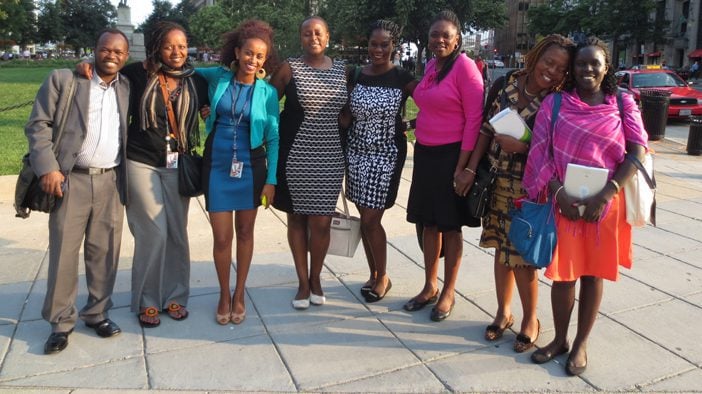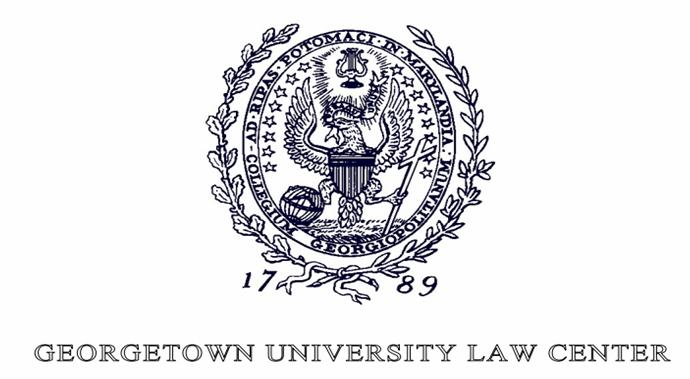Application Deadline: Friday, January 13, 2017.
The Leadership and Advocacy for Women in Africa (LAWA) Fellowship Program was founded in 1993 at the Georgetown University Law Center in Washington, DC, in order to train women’s human rights lawyers from Africa who are committed to returning home to their countries to advance the status of women and girls throughout their careers.
The entire LAWA Fellowship Program is approximately 14 months long – from July of the first year through late August of the following year. LAWA Fellows commit to returning home to continue advocating for women’s rights in their own countries. The LAWA Program starts in July, when the Fellows attend the Georgetown Law Center’s Foundations of American Law course. From August through May, the LAWA Fellows earn a Master of Laws (LL.M.) degree at Georgetown with an emphasis on international women’s human rights and complete a major graduate paper on a women’s rights issue. Fellows also participate in professional development seminars and networking events with recent U.S. law school graduates who are working in the field of women’s rights.
After graduation, the LAWA Fellows have an opportunity to engage in challenging work assignments for several months at various public interest organizations to learn about different advocacy strategies to advance women’s human rights, before returning to their important women’s rights work in their home countries.
Requirements:
- Candidates who are awarded a LAWA Fellowship must be prepared to cover the costs of all additional expenses (such as visas, travel, housing, utilities, food, clothing, health insurance, books, fees, etc.
- You must be a women’s human rights lawyer from Africa in order to be considered. You must hold an LL.B. or other law degree. Preference is given to those who:
- are currently living and working in Africa, and do not already have a Masters’ Degre
- The strongest applicants tend to be about five to ten years out of law school. Others with less of more experience may be considered and accepted into the LAWA Program. Candidates with no work experience and are applying directly from an LL.B. or other law school will not be considered
- Men who are committed to women’s rights are strongly encouraged to apply
- As a requirement of participation in the LAWA Program, all applicants must commit to return home to their own countries upon completion of the Fellowship, and to use their best professional efforts to advance women’s human rights in their counties throughout their careers.
- You must have strong English language skills, both written and oral. Language problems have been the primary barrier to success for LAWA Fellows.
- The LAWA Program requires candidates to become proficient in using computers for drafting papers and conducting research. Candidates are strongly encouraged to learn basic computer skills before arrival in order to make this transition easier. At the very minimum, candidates should work to improve their typing speed before starting the program.
- Candidates must be prepared to enter a very demanding course of study. LAWA Fellows take four required courses and several more elective courses over the course of the two semesters. Fellows are required to produce a Masters’ Thesis totaling no fewer than 40 pages, including several drafts with intense research, writing and editing. Successful completion of the program requires intense commitment, focus, and very hard work.

Benefits:
- The LAWA Program helps defray the costs for candidates who would not otherwise be able to afford an LL.M. degree focusing on international women’s human rights and additional professional development training.
- The LAWA Fellowship provides the tuition for the mandatory Foundations of American Law and Legal Education course held from mid-July to mid-August (a U.S. $2,000 benefit) and for the Master of Laws (LL.M.) degree from the Georgetown University Law Center (a U.S. $ $48,835 benefit).
- Candidates must be able to provide for their own living expenses while in the United States.
APPLICATION:
- Please Submit *All* of the Following to Apply. Incomplete Applications will NOT be considered:
- Complete the Application Form, including all three essay questions.
- Current Resume or CV, indicating:
- your employment history, including both paid and volunteer positions, including the name of your employer, location of your employment (city, country), dates of your employment (start and end dates), and description of your work for each position you have held;
- your education from high school to the present, including the name and location (city, country) of the institution, dates attended (including date of graduation), degree awarded, grade point average or your class rank and number of students, and your participation in any extracurricular activities;
- titles of any published materials (articles, books, reports, etc.) or significant research papers;
- any special honors, awards, scholarships, or fellowships; and
- any memberships in organizations or community activities in which you have been involved, including any leadership roles.
- Two Letters of Recommendation (letters of reference) from persons who are well acquainted with you, your commitment to advancing women’s human rights in your country, your legal abilities, and your work. At least one reference should be a person who is willing to assist you in a professional manner upon your return to your country. Recommendations should make specific reference to your skills and knowledge. Please do not submit references that just attest to your good character.
- Official Law School Transcript or indicate the date on which you requested the registrar’s office at your law school to send your transcript to us: ________________. YOU WILL NOT BE OFFERED A PLACE IN THE PROGRAM UNTIL WE RECEIVE YOUR OFFICIAL LAW SCHOOL TRANSCRIPT(S). PHOTOCOPIES OR EMAILS DIRECTLY FROM YOUR INSTITUTION ARE NOT SUFFICIENT. PLEASE INCLUDE AN EXPLANATION OF THE GRADING AND RANKING SYSTEM. TRANSCRIPTS WILL NOT BE RETURNED TO YOU.
Send your completed application via e-mail to [email protected] by Friday, January 13, 2017. Letters of recommendation may be scanned and sent as e-mail attachments (preferred), or may be mailed separately. Please use only one method – do not send multiple copies. If you applied last year, you do not need to re-send your transcript, but you must resubmit your completed application form with your responses to questions 1-20, your updated resume, and updated recommendation
Jill Morrison
Georgetown University Law Center
600 New Jersey Ave, NW, Room 5024A
Washington, DC 20001
E-mail: [email protected]
There is no need to apply separately to Georgetown. Please see our Frequently Asked Questions. If you are unable to find the answers on our website, please email [email protected].
You must check your email regularly beginning January 22nd, 2017, to see if you have been selected for an interview! If you are on travel, you MUST have someone checking for you. If you do not respond, we will select another candidate to interview and you will relinquish this opportunity.
For More Information:

